Tesco's Corporate Social Responsibility: An Ethical Overview
VerifiedAdded on 2023/01/13
|11
|3182
|59
Essay
AI Summary
This essay provides a comprehensive analysis of Tesco's Corporate Social Responsibility (CSR) practices. It begins by defining CSR and its importance for companies, emphasizing the benefits such as improved public image, increased brand awareness, and competitive advantage. The essay then delves into the ethical theories that influence Tesco's CSR decision-making, including utilitarian ethics, deontological ethics, and virtue ethics, illustrating how these theories shape the company's approach to its employees, environment, and social causes. The study also examines real-life examples of Tesco's CSR initiatives, such as its environmental programs, and discusses the company's commitment to subscribing to CSR codes. The essay concludes by highlighting the significance of CSR for Tesco and the ethical considerations that guide its corporate responsibility efforts, offering insights into the practical application of ethical theories in a business context.
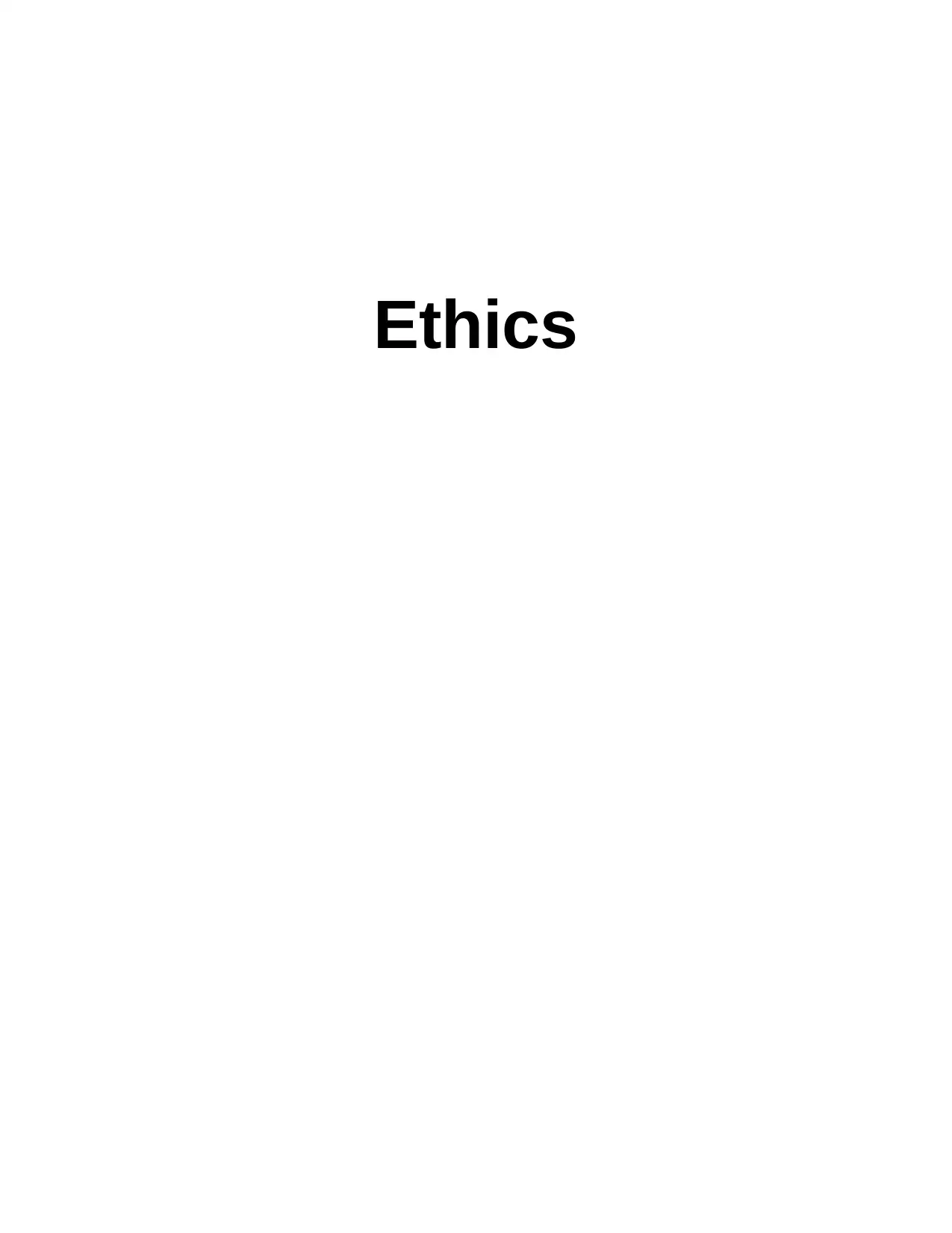
Ethics
Paraphrase This Document
Need a fresh take? Get an instant paraphrase of this document with our AI Paraphraser

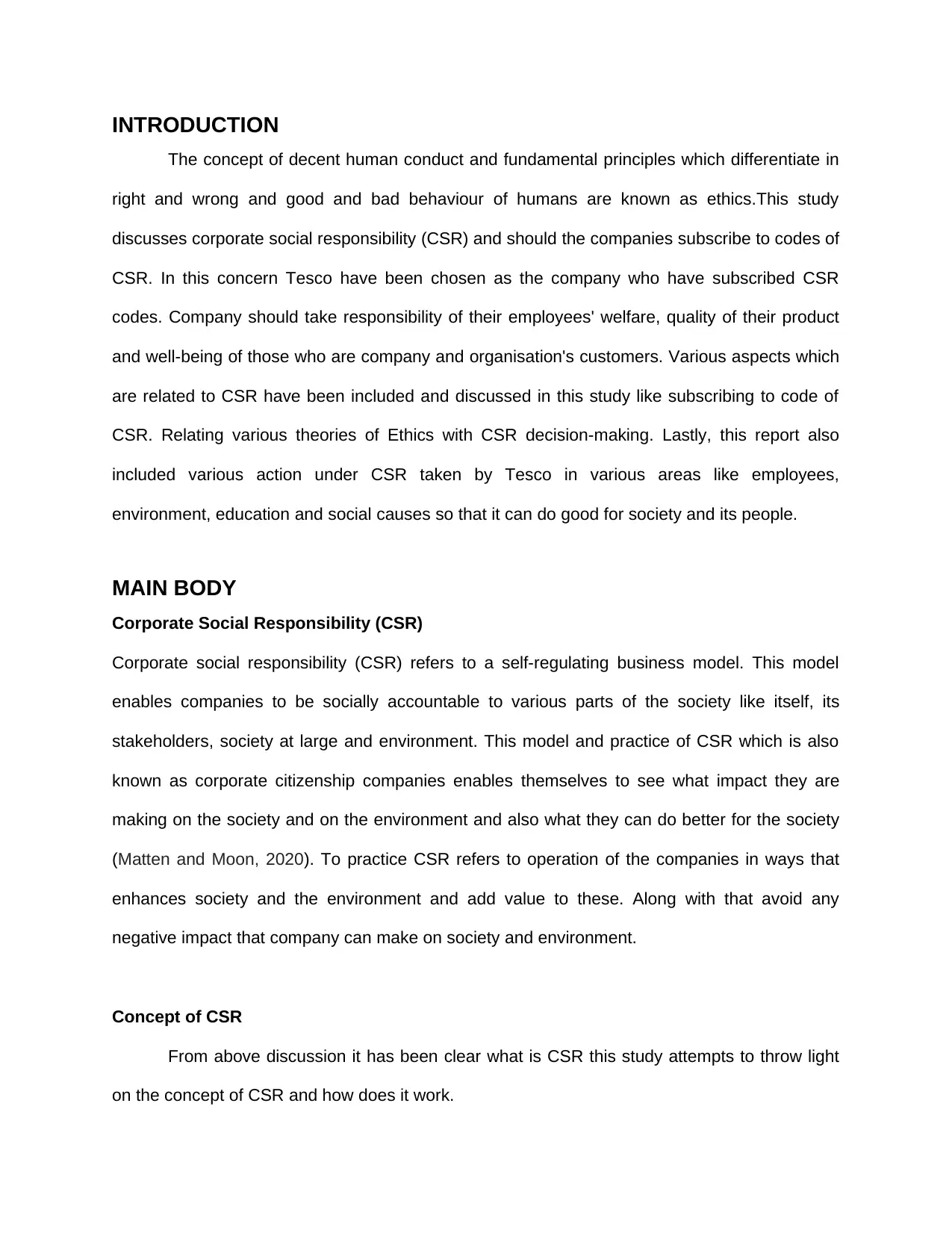
INTRODUCTION
The concept of decent human conduct and fundamental principles which differentiate in
right and wrong and good and bad behaviour of humans are known as ethics.This study
discusses corporate social responsibility (CSR) and should the companies subscribe to codes of
CSR. In this concern Tesco have been chosen as the company who have subscribed CSR
codes. Company should take responsibility of their employees' welfare, quality of their product
and well-being of those who are company and organisation's customers. Various aspects which
are related to CSR have been included and discussed in this study like subscribing to code of
CSR. Relating various theories of Ethics with CSR decision-making. Lastly, this report also
included various action under CSR taken by Tesco in various areas like employees,
environment, education and social causes so that it can do good for society and its people.
MAIN BODY
Corporate Social Responsibility (CSR)
Corporate social responsibility (CSR) refers to a self-regulating business model. This model
enables companies to be socially accountable to various parts of the society like itself, its
stakeholders, society at large and environment. This model and practice of CSR which is also
known as corporate citizenship companies enables themselves to see what impact they are
making on the society and on the environment and also what they can do better for the society
(Matten and Moon, 2020). To practice CSR refers to operation of the companies in ways that
enhances society and the environment and add value to these. Along with that avoid any
negative impact that company can make on society and environment.
Concept of CSR
From above discussion it has been clear what is CSR this study attempts to throw light
on the concept of CSR and how does it work.
The concept of decent human conduct and fundamental principles which differentiate in
right and wrong and good and bad behaviour of humans are known as ethics.This study
discusses corporate social responsibility (CSR) and should the companies subscribe to codes of
CSR. In this concern Tesco have been chosen as the company who have subscribed CSR
codes. Company should take responsibility of their employees' welfare, quality of their product
and well-being of those who are company and organisation's customers. Various aspects which
are related to CSR have been included and discussed in this study like subscribing to code of
CSR. Relating various theories of Ethics with CSR decision-making. Lastly, this report also
included various action under CSR taken by Tesco in various areas like employees,
environment, education and social causes so that it can do good for society and its people.
MAIN BODY
Corporate Social Responsibility (CSR)
Corporate social responsibility (CSR) refers to a self-regulating business model. This model
enables companies to be socially accountable to various parts of the society like itself, its
stakeholders, society at large and environment. This model and practice of CSR which is also
known as corporate citizenship companies enables themselves to see what impact they are
making on the society and on the environment and also what they can do better for the society
(Matten and Moon, 2020). To practice CSR refers to operation of the companies in ways that
enhances society and the environment and add value to these. Along with that avoid any
negative impact that company can make on society and environment.
Concept of CSR
From above discussion it has been clear what is CSR this study attempts to throw light
on the concept of CSR and how does it work.
⊘ This is a preview!⊘
Do you want full access?
Subscribe today to unlock all pages.

Trusted by 1+ million students worldwide
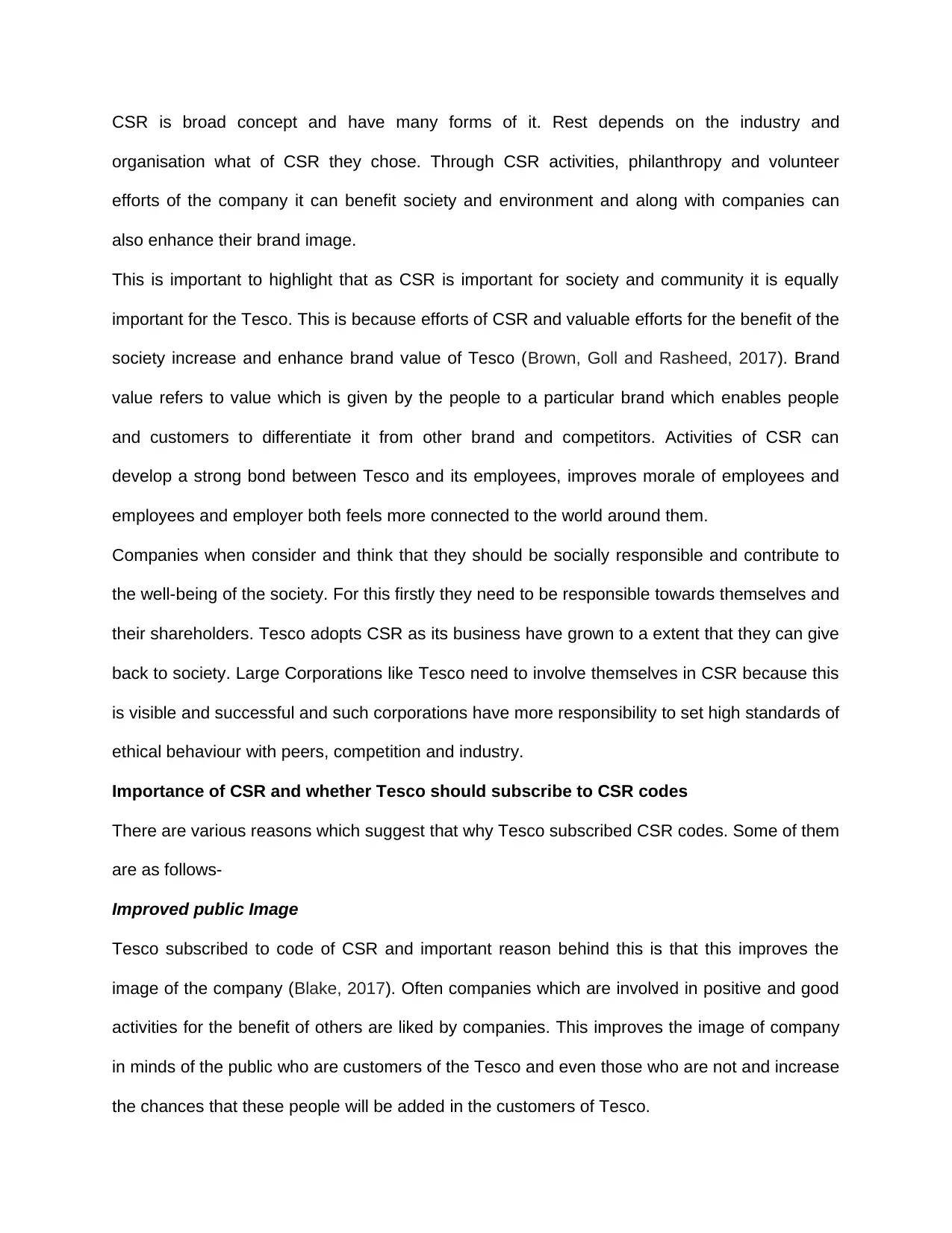
CSR is broad concept and have many forms of it. Rest depends on the industry and
organisation what of CSR they chose. Through CSR activities, philanthropy and volunteer
efforts of the company it can benefit society and environment and along with companies can
also enhance their brand image.
This is important to highlight that as CSR is important for society and community it is equally
important for the Tesco. This is because efforts of CSR and valuable efforts for the benefit of the
society increase and enhance brand value of Tesco (Brown, Goll and Rasheed, 2017). Brand
value refers to value which is given by the people to a particular brand which enables people
and customers to differentiate it from other brand and competitors. Activities of CSR can
develop a strong bond between Tesco and its employees, improves morale of employees and
employees and employer both feels more connected to the world around them.
Companies when consider and think that they should be socially responsible and contribute to
the well-being of the society. For this firstly they need to be responsible towards themselves and
their shareholders. Tesco adopts CSR as its business have grown to a extent that they can give
back to society. Large Corporations like Tesco need to involve themselves in CSR because this
is visible and successful and such corporations have more responsibility to set high standards of
ethical behaviour with peers, competition and industry.
Importance of CSR and whether Tesco should subscribe to CSR codes
There are various reasons which suggest that why Tesco subscribed CSR codes. Some of them
are as follows-
Improved public Image
Tesco subscribed to code of CSR and important reason behind this is that this improves the
image of the company (Blake, 2017). Often companies which are involved in positive and good
activities for the benefit of others are liked by companies. This improves the image of company
in minds of the public who are customers of the Tesco and even those who are not and increase
the chances that these people will be added in the customers of Tesco.
organisation what of CSR they chose. Through CSR activities, philanthropy and volunteer
efforts of the company it can benefit society and environment and along with companies can
also enhance their brand image.
This is important to highlight that as CSR is important for society and community it is equally
important for the Tesco. This is because efforts of CSR and valuable efforts for the benefit of the
society increase and enhance brand value of Tesco (Brown, Goll and Rasheed, 2017). Brand
value refers to value which is given by the people to a particular brand which enables people
and customers to differentiate it from other brand and competitors. Activities of CSR can
develop a strong bond between Tesco and its employees, improves morale of employees and
employees and employer both feels more connected to the world around them.
Companies when consider and think that they should be socially responsible and contribute to
the well-being of the society. For this firstly they need to be responsible towards themselves and
their shareholders. Tesco adopts CSR as its business have grown to a extent that they can give
back to society. Large Corporations like Tesco need to involve themselves in CSR because this
is visible and successful and such corporations have more responsibility to set high standards of
ethical behaviour with peers, competition and industry.
Importance of CSR and whether Tesco should subscribe to CSR codes
There are various reasons which suggest that why Tesco subscribed CSR codes. Some of them
are as follows-
Improved public Image
Tesco subscribed to code of CSR and important reason behind this is that this improves the
image of the company (Blake, 2017). Often companies which are involved in positive and good
activities for the benefit of others are liked by companies. This improves the image of company
in minds of the public who are customers of the Tesco and even those who are not and increase
the chances that these people will be added in the customers of Tesco.
Paraphrase This Document
Need a fresh take? Get an instant paraphrase of this document with our AI Paraphraser
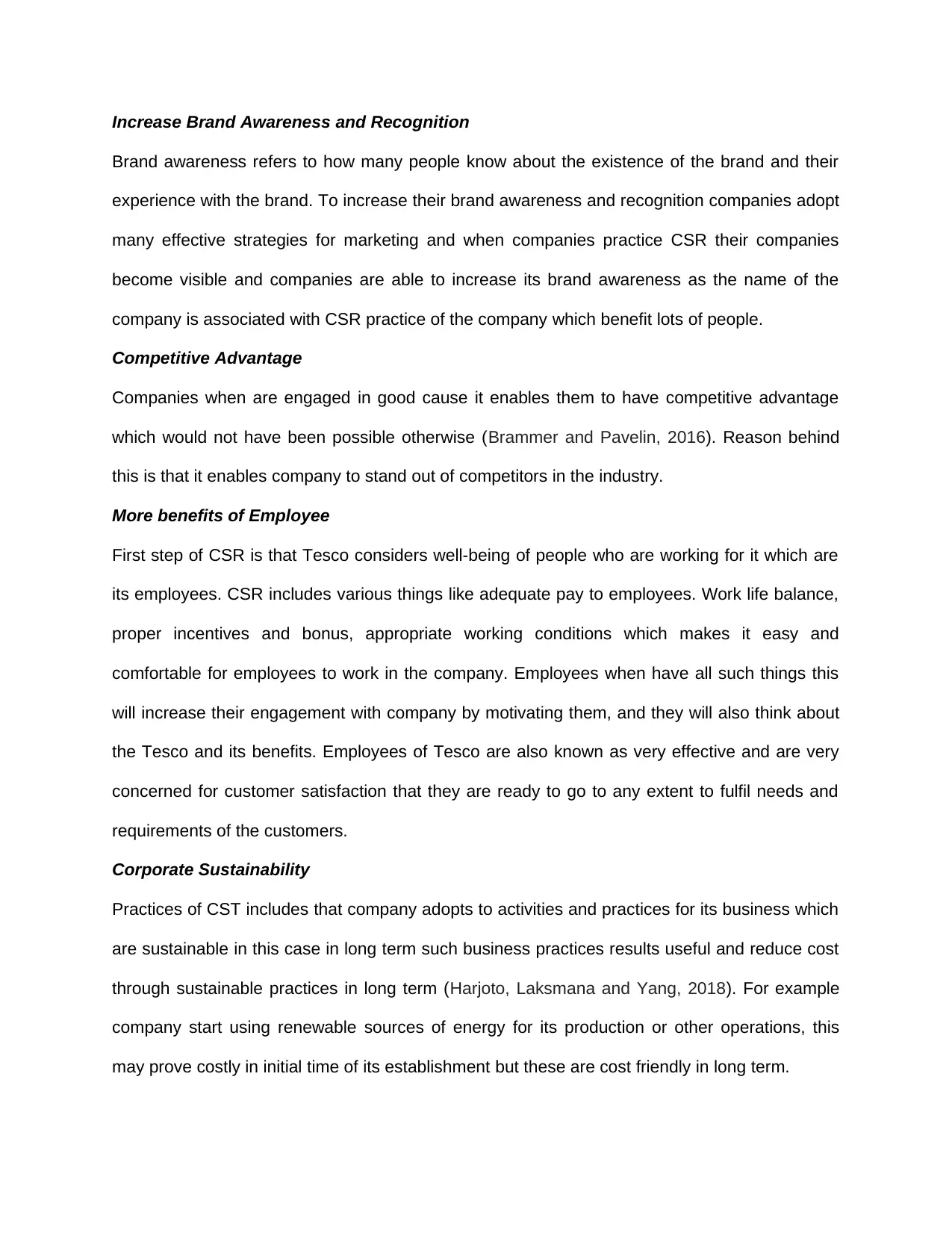
Increase Brand Awareness and Recognition
Brand awareness refers to how many people know about the existence of the brand and their
experience with the brand. To increase their brand awareness and recognition companies adopt
many effective strategies for marketing and when companies practice CSR their companies
become visible and companies are able to increase its brand awareness as the name of the
company is associated with CSR practice of the company which benefit lots of people.
Competitive Advantage
Companies when are engaged in good cause it enables them to have competitive advantage
which would not have been possible otherwise (Brammer and Pavelin, 2016). Reason behind
this is that it enables company to stand out of competitors in the industry.
More benefits of Employee
First step of CSR is that Tesco considers well-being of people who are working for it which are
its employees. CSR includes various things like adequate pay to employees. Work life balance,
proper incentives and bonus, appropriate working conditions which makes it easy and
comfortable for employees to work in the company. Employees when have all such things this
will increase their engagement with company by motivating them, and they will also think about
the Tesco and its benefits. Employees of Tesco are also known as very effective and are very
concerned for customer satisfaction that they are ready to go to any extent to fulfil needs and
requirements of the customers.
Corporate Sustainability
Practices of CST includes that company adopts to activities and practices for its business which
are sustainable in this case in long term such business practices results useful and reduce cost
through sustainable practices in long term (Harjoto, Laksmana and Yang, 2018). For example
company start using renewable sources of energy for its production or other operations, this
may prove costly in initial time of its establishment but these are cost friendly in long term.
Brand awareness refers to how many people know about the existence of the brand and their
experience with the brand. To increase their brand awareness and recognition companies adopt
many effective strategies for marketing and when companies practice CSR their companies
become visible and companies are able to increase its brand awareness as the name of the
company is associated with CSR practice of the company which benefit lots of people.
Competitive Advantage
Companies when are engaged in good cause it enables them to have competitive advantage
which would not have been possible otherwise (Brammer and Pavelin, 2016). Reason behind
this is that it enables company to stand out of competitors in the industry.
More benefits of Employee
First step of CSR is that Tesco considers well-being of people who are working for it which are
its employees. CSR includes various things like adequate pay to employees. Work life balance,
proper incentives and bonus, appropriate working conditions which makes it easy and
comfortable for employees to work in the company. Employees when have all such things this
will increase their engagement with company by motivating them, and they will also think about
the Tesco and its benefits. Employees of Tesco are also known as very effective and are very
concerned for customer satisfaction that they are ready to go to any extent to fulfil needs and
requirements of the customers.
Corporate Sustainability
Practices of CST includes that company adopts to activities and practices for its business which
are sustainable in this case in long term such business practices results useful and reduce cost
through sustainable practices in long term (Harjoto, Laksmana and Yang, 2018). For example
company start using renewable sources of energy for its production or other operations, this
may prove costly in initial time of its establishment but these are cost friendly in long term.
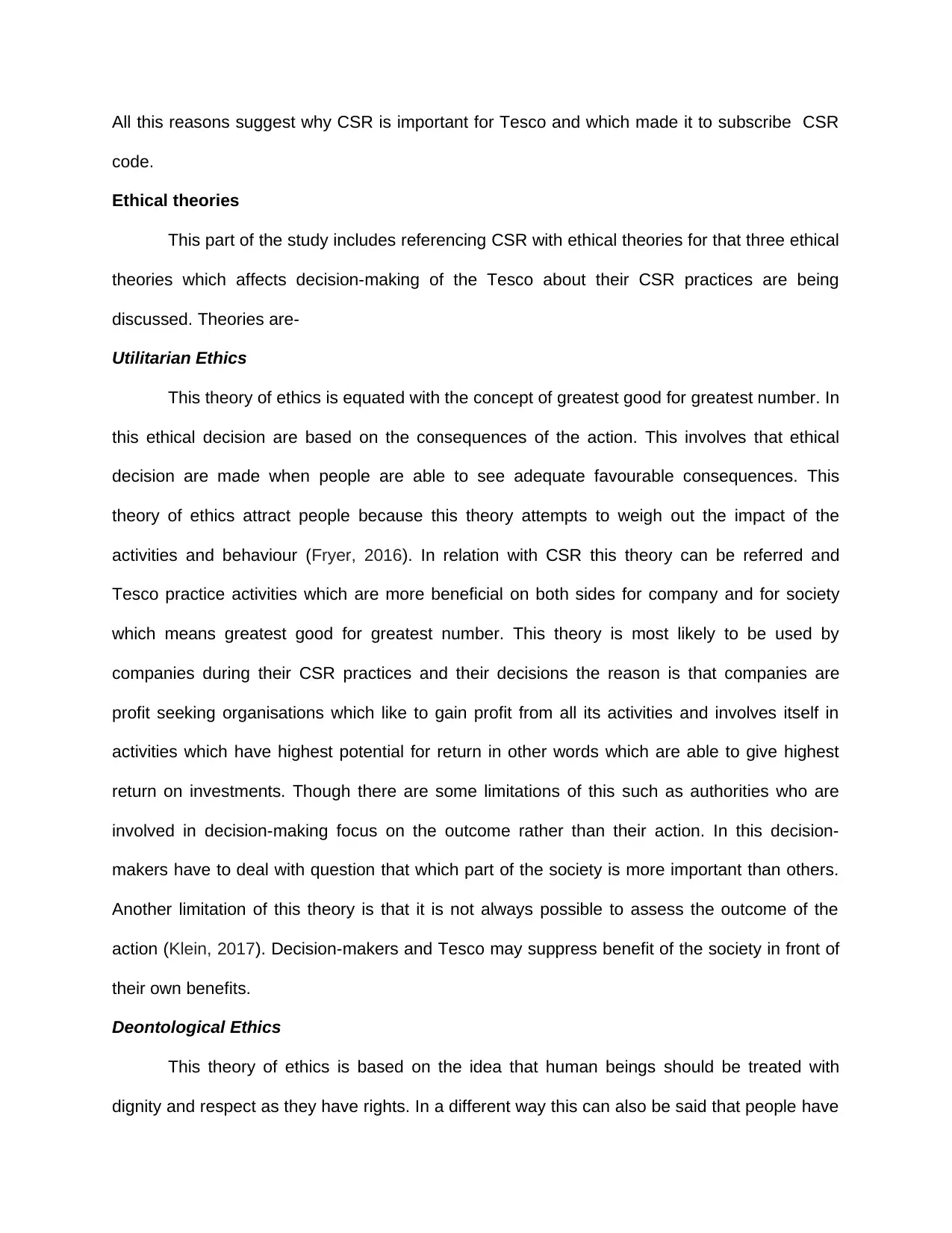
All this reasons suggest why CSR is important for Tesco and which made it to subscribe CSR
code.
Ethical theories
This part of the study includes referencing CSR with ethical theories for that three ethical
theories which affects decision-making of the Tesco about their CSR practices are being
discussed. Theories are-
Utilitarian Ethics
This theory of ethics is equated with the concept of greatest good for greatest number. In
this ethical decision are based on the consequences of the action. This involves that ethical
decision are made when people are able to see adequate favourable consequences. This
theory of ethics attract people because this theory attempts to weigh out the impact of the
activities and behaviour (Fryer, 2016). In relation with CSR this theory can be referred and
Tesco practice activities which are more beneficial on both sides for company and for society
which means greatest good for greatest number. This theory is most likely to be used by
companies during their CSR practices and their decisions the reason is that companies are
profit seeking organisations which like to gain profit from all its activities and involves itself in
activities which have highest potential for return in other words which are able to give highest
return on investments. Though there are some limitations of this such as authorities who are
involved in decision-making focus on the outcome rather than their action. In this decision-
makers have to deal with question that which part of the society is more important than others.
Another limitation of this theory is that it is not always possible to assess the outcome of the
action (Klein, 2017). Decision-makers and Tesco may suppress benefit of the society in front of
their own benefits.
Deontological Ethics
This theory of ethics is based on the idea that human beings should be treated with
dignity and respect as they have rights. In a different way this can also be said that people have
code.
Ethical theories
This part of the study includes referencing CSR with ethical theories for that three ethical
theories which affects decision-making of the Tesco about their CSR practices are being
discussed. Theories are-
Utilitarian Ethics
This theory of ethics is equated with the concept of greatest good for greatest number. In
this ethical decision are based on the consequences of the action. This involves that ethical
decision are made when people are able to see adequate favourable consequences. This
theory of ethics attract people because this theory attempts to weigh out the impact of the
activities and behaviour (Fryer, 2016). In relation with CSR this theory can be referred and
Tesco practice activities which are more beneficial on both sides for company and for society
which means greatest good for greatest number. This theory is most likely to be used by
companies during their CSR practices and their decisions the reason is that companies are
profit seeking organisations which like to gain profit from all its activities and involves itself in
activities which have highest potential for return in other words which are able to give highest
return on investments. Though there are some limitations of this such as authorities who are
involved in decision-making focus on the outcome rather than their action. In this decision-
makers have to deal with question that which part of the society is more important than others.
Another limitation of this theory is that it is not always possible to assess the outcome of the
action (Klein, 2017). Decision-makers and Tesco may suppress benefit of the society in front of
their own benefits.
Deontological Ethics
This theory of ethics is based on the idea that human beings should be treated with
dignity and respect as they have rights. In a different way this can also be said that people have
⊘ This is a preview!⊘
Do you want full access?
Subscribe today to unlock all pages.

Trusted by 1+ million students worldwide
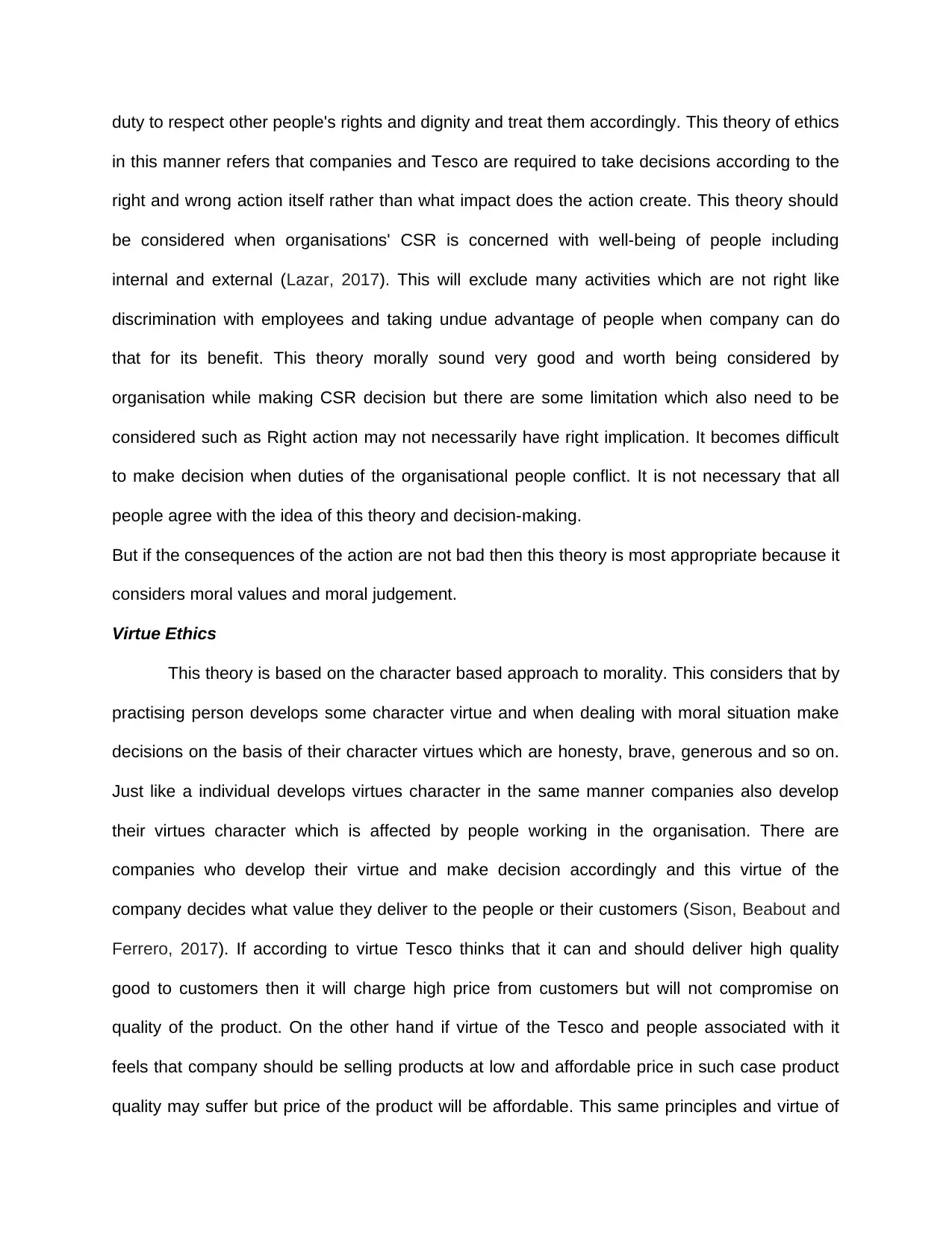
duty to respect other people's rights and dignity and treat them accordingly. This theory of ethics
in this manner refers that companies and Tesco are required to take decisions according to the
right and wrong action itself rather than what impact does the action create. This theory should
be considered when organisations' CSR is concerned with well-being of people including
internal and external (Lazar, 2017). This will exclude many activities which are not right like
discrimination with employees and taking undue advantage of people when company can do
that for its benefit. This theory morally sound very good and worth being considered by
organisation while making CSR decision but there are some limitation which also need to be
considered such as Right action may not necessarily have right implication. It becomes difficult
to make decision when duties of the organisational people conflict. It is not necessary that all
people agree with the idea of this theory and decision-making.
But if the consequences of the action are not bad then this theory is most appropriate because it
considers moral values and moral judgement.
Virtue Ethics
This theory is based on the character based approach to morality. This considers that by
practising person develops some character virtue and when dealing with moral situation make
decisions on the basis of their character virtues which are honesty, brave, generous and so on.
Just like a individual develops virtues character in the same manner companies also develop
their virtues character which is affected by people working in the organisation. There are
companies who develop their virtue and make decision accordingly and this virtue of the
company decides what value they deliver to the people or their customers (Sison, Beabout and
Ferrero, 2017). If according to virtue Tesco thinks that it can and should deliver high quality
good to customers then it will charge high price from customers but will not compromise on
quality of the product. On the other hand if virtue of the Tesco and people associated with it
feels that company should be selling products at low and affordable price in such case product
quality may suffer but price of the product will be affordable. This same principles and virtue of
in this manner refers that companies and Tesco are required to take decisions according to the
right and wrong action itself rather than what impact does the action create. This theory should
be considered when organisations' CSR is concerned with well-being of people including
internal and external (Lazar, 2017). This will exclude many activities which are not right like
discrimination with employees and taking undue advantage of people when company can do
that for its benefit. This theory morally sound very good and worth being considered by
organisation while making CSR decision but there are some limitation which also need to be
considered such as Right action may not necessarily have right implication. It becomes difficult
to make decision when duties of the organisational people conflict. It is not necessary that all
people agree with the idea of this theory and decision-making.
But if the consequences of the action are not bad then this theory is most appropriate because it
considers moral values and moral judgement.
Virtue Ethics
This theory is based on the character based approach to morality. This considers that by
practising person develops some character virtue and when dealing with moral situation make
decisions on the basis of their character virtues which are honesty, brave, generous and so on.
Just like a individual develops virtues character in the same manner companies also develop
their virtues character which is affected by people working in the organisation. There are
companies who develop their virtue and make decision accordingly and this virtue of the
company decides what value they deliver to the people or their customers (Sison, Beabout and
Ferrero, 2017). If according to virtue Tesco thinks that it can and should deliver high quality
good to customers then it will charge high price from customers but will not compromise on
quality of the product. On the other hand if virtue of the Tesco and people associated with it
feels that company should be selling products at low and affordable price in such case product
quality may suffer but price of the product will be affordable. This same principles and virtue of
Paraphrase This Document
Need a fresh take? Get an instant paraphrase of this document with our AI Paraphraser
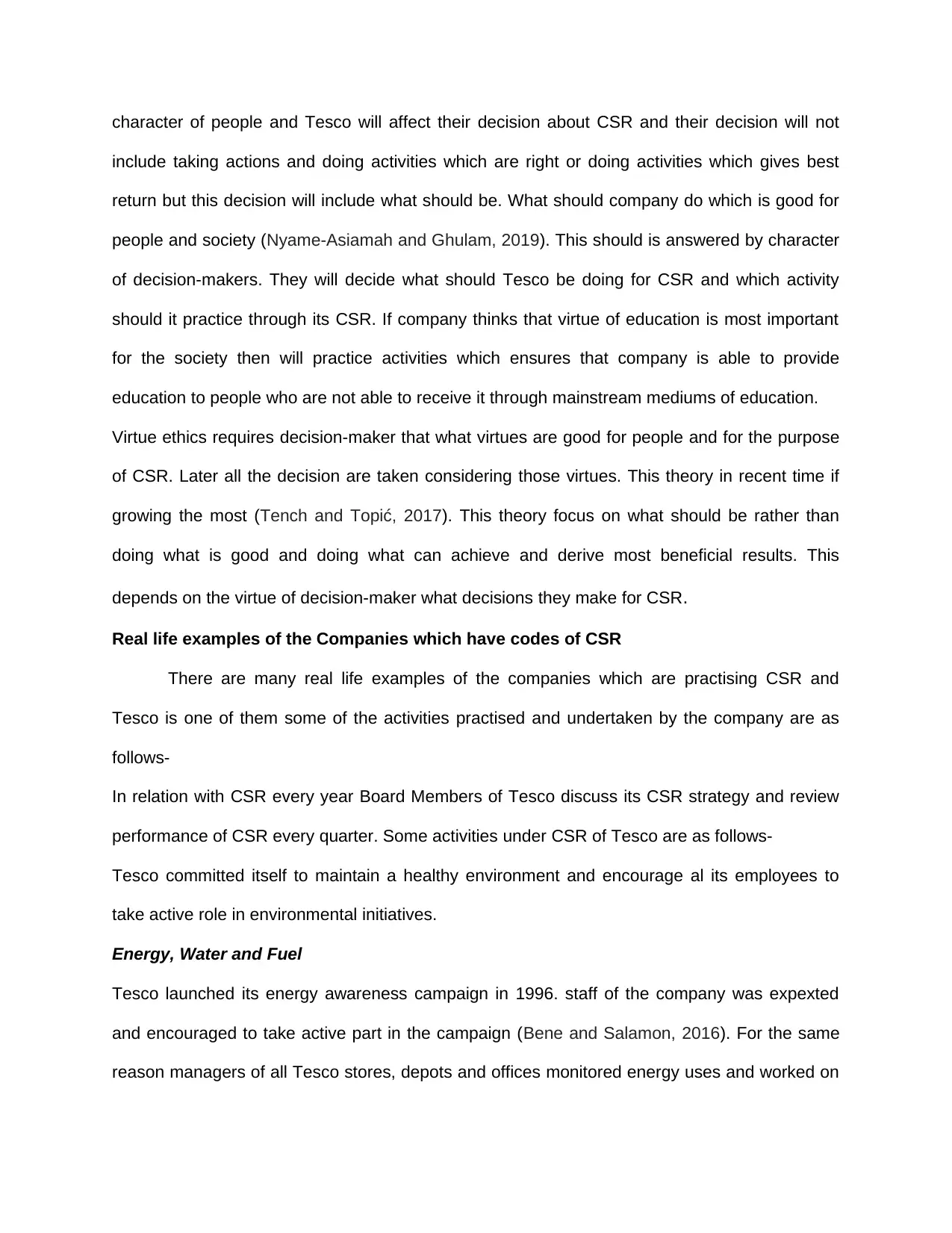
character of people and Tesco will affect their decision about CSR and their decision will not
include taking actions and doing activities which are right or doing activities which gives best
return but this decision will include what should be. What should company do which is good for
people and society (Nyame-Asiamah and Ghulam, 2019). This should is answered by character
of decision-makers. They will decide what should Tesco be doing for CSR and which activity
should it practice through its CSR. If company thinks that virtue of education is most important
for the society then will practice activities which ensures that company is able to provide
education to people who are not able to receive it through mainstream mediums of education.
Virtue ethics requires decision-maker that what virtues are good for people and for the purpose
of CSR. Later all the decision are taken considering those virtues. This theory in recent time if
growing the most (Tench and Topić, 2017). This theory focus on what should be rather than
doing what is good and doing what can achieve and derive most beneficial results. This
depends on the virtue of decision-maker what decisions they make for CSR.
Real life examples of the Companies which have codes of CSR
There are many real life examples of the companies which are practising CSR and
Tesco is one of them some of the activities practised and undertaken by the company are as
follows-
In relation with CSR every year Board Members of Tesco discuss its CSR strategy and review
performance of CSR every quarter. Some activities under CSR of Tesco are as follows-
Tesco committed itself to maintain a healthy environment and encourage al its employees to
take active role in environmental initiatives.
Energy, Water and Fuel
Tesco launched its energy awareness campaign in 1996. staff of the company was expexted
and encouraged to take active part in the campaign (Bene and Salamon, 2016). For the same
reason managers of all Tesco stores, depots and offices monitored energy uses and worked on
include taking actions and doing activities which are right or doing activities which gives best
return but this decision will include what should be. What should company do which is good for
people and society (Nyame-Asiamah and Ghulam, 2019). This should is answered by character
of decision-makers. They will decide what should Tesco be doing for CSR and which activity
should it practice through its CSR. If company thinks that virtue of education is most important
for the society then will practice activities which ensures that company is able to provide
education to people who are not able to receive it through mainstream mediums of education.
Virtue ethics requires decision-maker that what virtues are good for people and for the purpose
of CSR. Later all the decision are taken considering those virtues. This theory in recent time if
growing the most (Tench and Topić, 2017). This theory focus on what should be rather than
doing what is good and doing what can achieve and derive most beneficial results. This
depends on the virtue of decision-maker what decisions they make for CSR.
Real life examples of the Companies which have codes of CSR
There are many real life examples of the companies which are practising CSR and
Tesco is one of them some of the activities practised and undertaken by the company are as
follows-
In relation with CSR every year Board Members of Tesco discuss its CSR strategy and review
performance of CSR every quarter. Some activities under CSR of Tesco are as follows-
Tesco committed itself to maintain a healthy environment and encourage al its employees to
take active role in environmental initiatives.
Energy, Water and Fuel
Tesco launched its energy awareness campaign in 1996. staff of the company was expexted
and encouraged to take active part in the campaign (Bene and Salamon, 2016). For the same
reason managers of all Tesco stores, depots and offices monitored energy uses and worked on
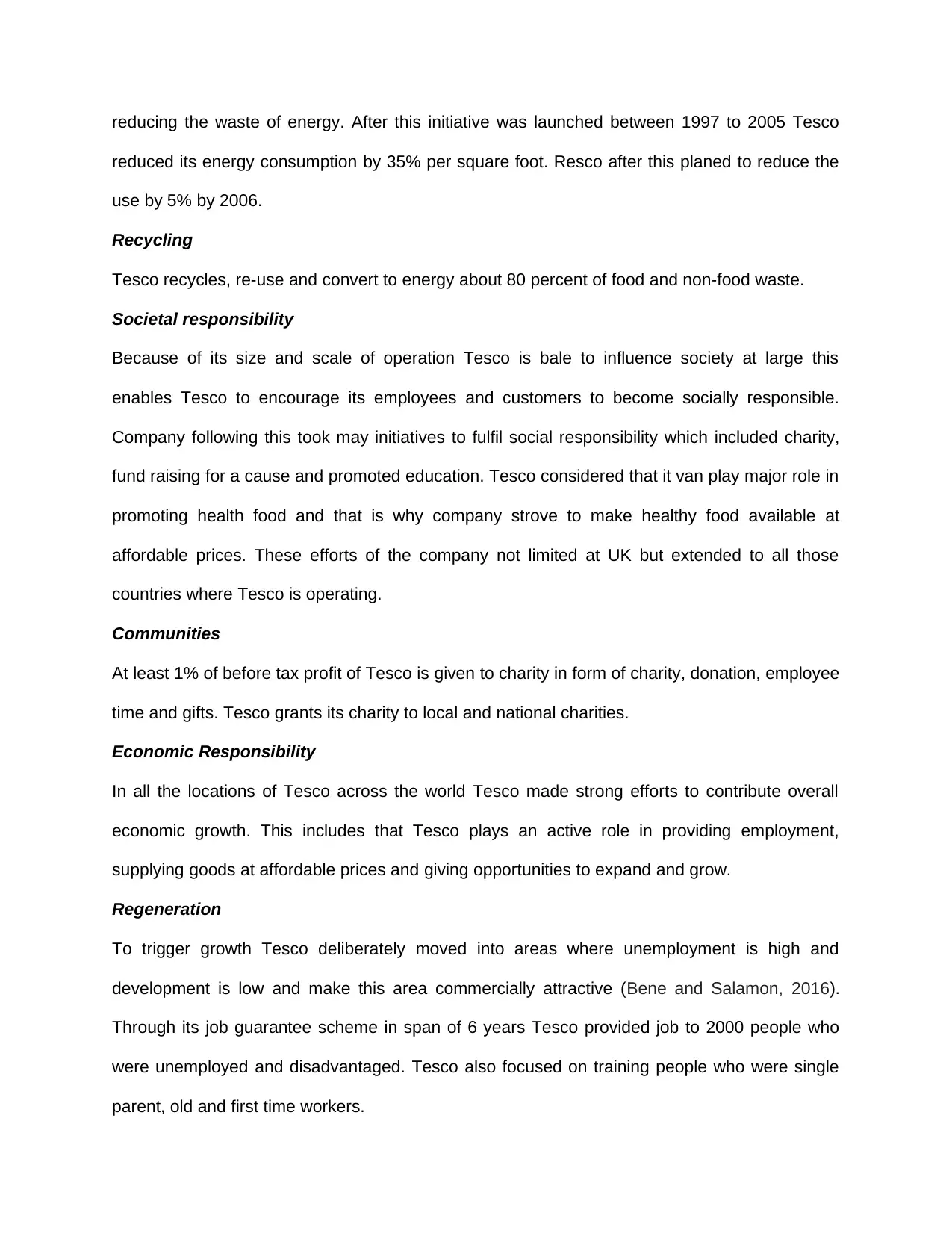
reducing the waste of energy. After this initiative was launched between 1997 to 2005 Tesco
reduced its energy consumption by 35% per square foot. Resco after this planed to reduce the
use by 5% by 2006.
Recycling
Tesco recycles, re-use and convert to energy about 80 percent of food and non-food waste.
Societal responsibility
Because of its size and scale of operation Tesco is bale to influence society at large this
enables Tesco to encourage its employees and customers to become socially responsible.
Company following this took may initiatives to fulfil social responsibility which included charity,
fund raising for a cause and promoted education. Tesco considered that it van play major role in
promoting health food and that is why company strove to make healthy food available at
affordable prices. These efforts of the company not limited at UK but extended to all those
countries where Tesco is operating.
Communities
At least 1% of before tax profit of Tesco is given to charity in form of charity, donation, employee
time and gifts. Tesco grants its charity to local and national charities.
Economic Responsibility
In all the locations of Tesco across the world Tesco made strong efforts to contribute overall
economic growth. This includes that Tesco plays an active role in providing employment,
supplying goods at affordable prices and giving opportunities to expand and grow.
Regeneration
To trigger growth Tesco deliberately moved into areas where unemployment is high and
development is low and make this area commercially attractive (Bene and Salamon, 2016).
Through its job guarantee scheme in span of 6 years Tesco provided job to 2000 people who
were unemployed and disadvantaged. Tesco also focused on training people who were single
parent, old and first time workers.
reduced its energy consumption by 35% per square foot. Resco after this planed to reduce the
use by 5% by 2006.
Recycling
Tesco recycles, re-use and convert to energy about 80 percent of food and non-food waste.
Societal responsibility
Because of its size and scale of operation Tesco is bale to influence society at large this
enables Tesco to encourage its employees and customers to become socially responsible.
Company following this took may initiatives to fulfil social responsibility which included charity,
fund raising for a cause and promoted education. Tesco considered that it van play major role in
promoting health food and that is why company strove to make healthy food available at
affordable prices. These efforts of the company not limited at UK but extended to all those
countries where Tesco is operating.
Communities
At least 1% of before tax profit of Tesco is given to charity in form of charity, donation, employee
time and gifts. Tesco grants its charity to local and national charities.
Economic Responsibility
In all the locations of Tesco across the world Tesco made strong efforts to contribute overall
economic growth. This includes that Tesco plays an active role in providing employment,
supplying goods at affordable prices and giving opportunities to expand and grow.
Regeneration
To trigger growth Tesco deliberately moved into areas where unemployment is high and
development is low and make this area commercially attractive (Bene and Salamon, 2016).
Through its job guarantee scheme in span of 6 years Tesco provided job to 2000 people who
were unemployed and disadvantaged. Tesco also focused on training people who were single
parent, old and first time workers.
⊘ This is a preview!⊘
Do you want full access?
Subscribe today to unlock all pages.

Trusted by 1+ million students worldwide
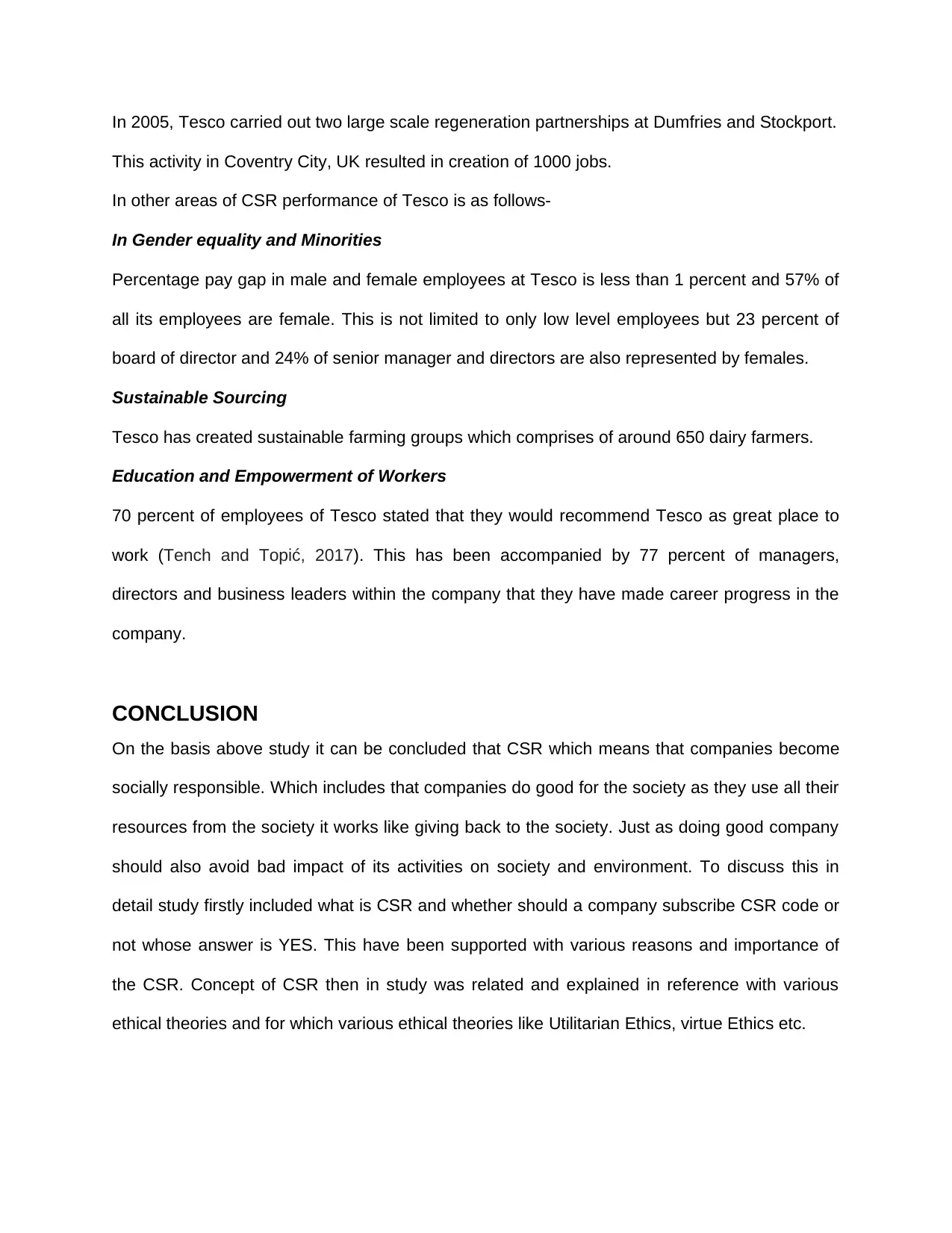
In 2005, Tesco carried out two large scale regeneration partnerships at Dumfries and Stockport.
This activity in Coventry City, UK resulted in creation of 1000 jobs.
In other areas of CSR performance of Tesco is as follows-
In Gender equality and Minorities
Percentage pay gap in male and female employees at Tesco is less than 1 percent and 57% of
all its employees are female. This is not limited to only low level employees but 23 percent of
board of director and 24% of senior manager and directors are also represented by females.
Sustainable Sourcing
Tesco has created sustainable farming groups which comprises of around 650 dairy farmers.
Education and Empowerment of Workers
70 percent of employees of Tesco stated that they would recommend Tesco as great place to
work (Tench and Topić, 2017). This has been accompanied by 77 percent of managers,
directors and business leaders within the company that they have made career progress in the
company.
CONCLUSION
On the basis above study it can be concluded that CSR which means that companies become
socially responsible. Which includes that companies do good for the society as they use all their
resources from the society it works like giving back to the society. Just as doing good company
should also avoid bad impact of its activities on society and environment. To discuss this in
detail study firstly included what is CSR and whether should a company subscribe CSR code or
not whose answer is YES. This have been supported with various reasons and importance of
the CSR. Concept of CSR then in study was related and explained in reference with various
ethical theories and for which various ethical theories like Utilitarian Ethics, virtue Ethics etc.
This activity in Coventry City, UK resulted in creation of 1000 jobs.
In other areas of CSR performance of Tesco is as follows-
In Gender equality and Minorities
Percentage pay gap in male and female employees at Tesco is less than 1 percent and 57% of
all its employees are female. This is not limited to only low level employees but 23 percent of
board of director and 24% of senior manager and directors are also represented by females.
Sustainable Sourcing
Tesco has created sustainable farming groups which comprises of around 650 dairy farmers.
Education and Empowerment of Workers
70 percent of employees of Tesco stated that they would recommend Tesco as great place to
work (Tench and Topić, 2017). This has been accompanied by 77 percent of managers,
directors and business leaders within the company that they have made career progress in the
company.
CONCLUSION
On the basis above study it can be concluded that CSR which means that companies become
socially responsible. Which includes that companies do good for the society as they use all their
resources from the society it works like giving back to the society. Just as doing good company
should also avoid bad impact of its activities on society and environment. To discuss this in
detail study firstly included what is CSR and whether should a company subscribe CSR code or
not whose answer is YES. This have been supported with various reasons and importance of
the CSR. Concept of CSR then in study was related and explained in reference with various
ethical theories and for which various ethical theories like Utilitarian Ethics, virtue Ethics etc.
Paraphrase This Document
Need a fresh take? Get an instant paraphrase of this document with our AI Paraphraser
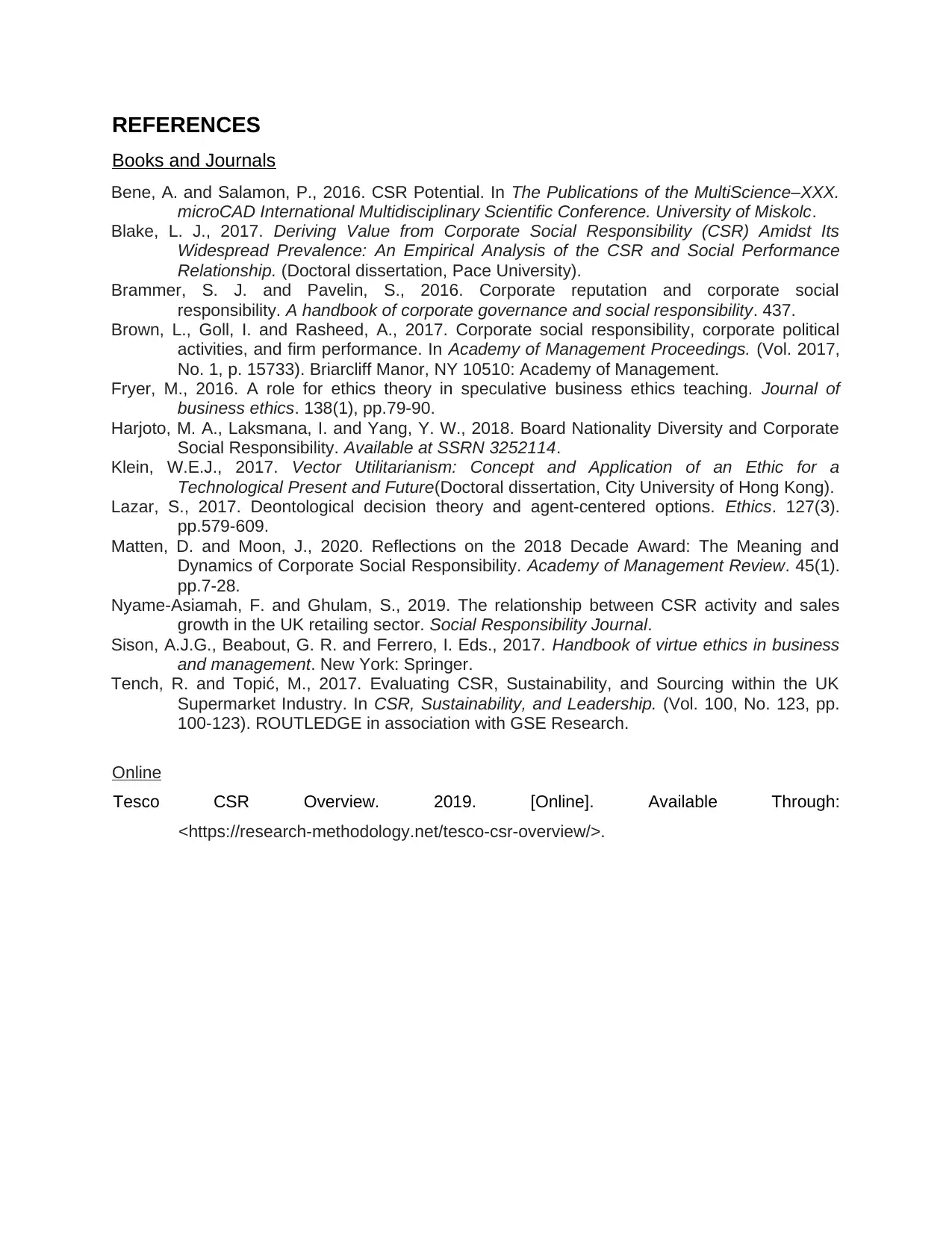
REFERENCES
Books and Journals
Bene, A. and Salamon, P., 2016. CSR Potential. In The Publications of the MultiScience–XXX.
microCAD International Multidisciplinary Scientific Conference. University of Miskolc.
Blake, L. J., 2017. Deriving Value from Corporate Social Responsibility (CSR) Amidst Its
Widespread Prevalence: An Empirical Analysis of the CSR and Social Performance
Relationship. (Doctoral dissertation, Pace University).
Brammer, S. J. and Pavelin, S., 2016. Corporate reputation and corporate social
responsibility. A handbook of corporate governance and social responsibility. 437.
Brown, L., Goll, I. and Rasheed, A., 2017. Corporate social responsibility, corporate political
activities, and firm performance. In Academy of Management Proceedings. (Vol. 2017,
No. 1, p. 15733). Briarcliff Manor, NY 10510: Academy of Management.
Fryer, M., 2016. A role for ethics theory in speculative business ethics teaching. Journal of
business ethics. 138(1), pp.79-90.
Harjoto, M. A., Laksmana, I. and Yang, Y. W., 2018. Board Nationality Diversity and Corporate
Social Responsibility. Available at SSRN 3252114.
Klein, W.E.J., 2017. Vector Utilitarianism: Concept and Application of an Ethic for a
Technological Present and Future(Doctoral dissertation, City University of Hong Kong).
Lazar, S., 2017. Deontological decision theory and agent-centered options. Ethics. 127(3).
pp.579-609.
Matten, D. and Moon, J., 2020. Reflections on the 2018 Decade Award: The Meaning and
Dynamics of Corporate Social Responsibility. Academy of Management Review. 45(1).
pp.7-28.
Nyame-Asiamah, F. and Ghulam, S., 2019. The relationship between CSR activity and sales
growth in the UK retailing sector. Social Responsibility Journal.
Sison, A.J.G., Beabout, G. R. and Ferrero, I. Eds., 2017. Handbook of virtue ethics in business
and management. New York: Springer.
Tench, R. and Topić, M., 2017. Evaluating CSR, Sustainability, and Sourcing within the UK
Supermarket Industry. In CSR, Sustainability, and Leadership. (Vol. 100, No. 123, pp.
100-123). ROUTLEDGE in association with GSE Research.
Online
Tesco CSR Overview. 2019. [Online]. Available Through:
<https://research-methodology.net/tesco-csr-overview/>.
Books and Journals
Bene, A. and Salamon, P., 2016. CSR Potential. In The Publications of the MultiScience–XXX.
microCAD International Multidisciplinary Scientific Conference. University of Miskolc.
Blake, L. J., 2017. Deriving Value from Corporate Social Responsibility (CSR) Amidst Its
Widespread Prevalence: An Empirical Analysis of the CSR and Social Performance
Relationship. (Doctoral dissertation, Pace University).
Brammer, S. J. and Pavelin, S., 2016. Corporate reputation and corporate social
responsibility. A handbook of corporate governance and social responsibility. 437.
Brown, L., Goll, I. and Rasheed, A., 2017. Corporate social responsibility, corporate political
activities, and firm performance. In Academy of Management Proceedings. (Vol. 2017,
No. 1, p. 15733). Briarcliff Manor, NY 10510: Academy of Management.
Fryer, M., 2016. A role for ethics theory in speculative business ethics teaching. Journal of
business ethics. 138(1), pp.79-90.
Harjoto, M. A., Laksmana, I. and Yang, Y. W., 2018. Board Nationality Diversity and Corporate
Social Responsibility. Available at SSRN 3252114.
Klein, W.E.J., 2017. Vector Utilitarianism: Concept and Application of an Ethic for a
Technological Present and Future(Doctoral dissertation, City University of Hong Kong).
Lazar, S., 2017. Deontological decision theory and agent-centered options. Ethics. 127(3).
pp.579-609.
Matten, D. and Moon, J., 2020. Reflections on the 2018 Decade Award: The Meaning and
Dynamics of Corporate Social Responsibility. Academy of Management Review. 45(1).
pp.7-28.
Nyame-Asiamah, F. and Ghulam, S., 2019. The relationship between CSR activity and sales
growth in the UK retailing sector. Social Responsibility Journal.
Sison, A.J.G., Beabout, G. R. and Ferrero, I. Eds., 2017. Handbook of virtue ethics in business
and management. New York: Springer.
Tench, R. and Topić, M., 2017. Evaluating CSR, Sustainability, and Sourcing within the UK
Supermarket Industry. In CSR, Sustainability, and Leadership. (Vol. 100, No. 123, pp.
100-123). ROUTLEDGE in association with GSE Research.
Online
Tesco CSR Overview. 2019. [Online]. Available Through:
<https://research-methodology.net/tesco-csr-overview/>.
1 out of 11
Related Documents
Your All-in-One AI-Powered Toolkit for Academic Success.
+13062052269
info@desklib.com
Available 24*7 on WhatsApp / Email
![[object Object]](/_next/static/media/star-bottom.7253800d.svg)
Unlock your academic potential
Copyright © 2020–2026 A2Z Services. All Rights Reserved. Developed and managed by ZUCOL.





